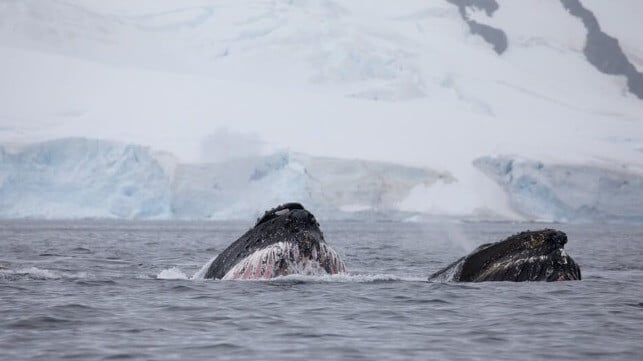Antarctic Krill Fishery Hits Cap, Prompting Overfishing Concerns

The krill fishery off Antarctica has surged in volume this year, so much so that the Commission for the Conservation of Antarctic Marine Living Resources (CCAMLR) has decided to close the fishing season five months early.
The volume of the krill catch took off this year after CCAMLR allowed geographic restrictions on fishing to lapse. Last year, CCAMLR member states did not reach agreement on a proposed management plan for krill, which would have created a new marine protected area withdrawn from fishing activity. The meeting also failed to reach consensus on renewing a mechanism that spreads out the fishing fleet by limits how much krill fishing can be done in any one area. With that limit lifted, krill fishing vessels were allowed to concentrate their effort on small, productive locations that are also preferred by whales and seals, increasing commercial efficiency. The take quickly soared to 620,000 tonnes in the first half of the year, up from 500,000 tonnes in all of 2023-24.
"The entire permitted catch was taken in a highly concentrated area, leaving the Southern Ocean's most iconic predators with far less to feed on. If CCAMLR hopes to retain credibility at this year's meeting in October, its members must restore precautionary, ecosystem-based krill management," said Dr. Johnny Briggs, director of the Pew Bartarelli Ocean Legacy.
Krill is in high demand as an ingredient in fishmeal, a feedstock for fish farms (like Atlantic salmon and tilapia producers) and for pet food. Krill oil is also used as a popular dietary supplement. These uses put consumers in competition with whales for the available calories in Antarctic waters, environmental groups warn.
"Krill is at the base of the food chain in Antarctica and increasing demand from companies seeking to sell fishmeal, pet food and dietary supplements has led to a spiraling increase in catch," said NGO Antarctic and Southern Ocean Coalition (ASOC) in a statement. "Scientific research has previously shown that krill predators [whales, penguins and seals] are negatively affected by fishing at an even lower level of catch than was seen this year."
